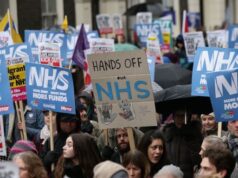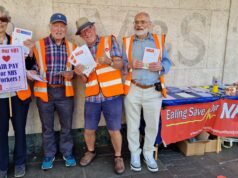Ealing Hospital is Open For Business
This was the message which came out loud and clear from Ealing Hospital bosses on 7 November 2013. A group of healthcare activists spent over an hour with David McVittie and Dr William Lynn. The former is Acting CEO and the latter Deputy CEO of the Ealing Hospital NHS Trust.
These managers are clearly responsible for providing a safe, predictable and well resourced set of medical services to anyone who walks through the doors of Ealing Hospital. This is in spite of a continuum of waves of essentially non-clinical challenges forever attempting to disrupt their best endeavours. There’s the marketisation of healthcare, the Foundation Trust imperative, the destruction of the local PCT, the embryonic ECCG, the must-have Trusts’ merger, the Shaping a Healthier Future hospital downsizing saga, the Francis Inquiry and now the Keogh A&E recommendations.
Some Headlines:
At the earliest Ealing Hospital A&E – as we all know it – will disappear at the end of 2016
Ealing Hospital Maternity Service – as we know it – will disappear in 2/3 years time and probably before A&E is ‘downsized’
Paediatrics – as we know it – will disappear at Ealing Hospital soon after Maternity is ‘reconfigured’
No Ealing Hospital services will be closed down until alternative, accessible services are available elsewhere
David McVittie is an Accountant who cut his management teeth at BT. In the past he ran Hillingdon Hospital and he currently runs, and is based at, Northwick Park Hospital (as CEO of the NW London Hospitals Trust) and is also responsible for Ealing Hospital. William Lynn is a practicing clinician (Tuberculosis expert) who has worked at St George’s, Hillingdon and Hammersmith Hospitals rising to Medical Director level.
Irrespective of what Jeremy Hunt MP said in Parliament on 31 October 2013 and what the NHS NW London Independent Review Panel report says, McVittie says that at some point blue light flashing ambulances will no longer deliver patients to Ealing Hospital. Ealing Hospital will at some point not run an Intensive Care Unit. There will be no surgical in-patient beds and no operations carried out using general anaesthetic.
What is likely to emerge, he says, is some sort of added value Ealing Hospital Urgent Care Centre, with additional ‘bits’ such as X-Ray and scanning. If there is sufficient expected volume then there might also be day surgical facilities.
Central Middlesex Hospital A&E (open 7:00am to 7:00pm) will not close down immediately following the end of this winter.
Post natal and ante natal services will be retained at Ealing Hospital – but no babies will actually be born there under the impending reconfiguration. Viable volumes of births to justify birthing services are 5,600 births/year. Last year just 2,400 births took place at Ealing Hospital. The logic is that skill sets are high with high volumes of work and low with low volumes of work. (However the Royal College of Midwives stated that 28% of Maternity Wards in England turned away mums-to-be because of lack of space or shortage of midwives between April and September last year).
There is currently inadequate capacity at Northwick Park Hospital to take the volume of A&E patients who are currently being treated at Ealing Hospital.
We asked about referrals to private companies e.g. InHealth scanning service in central West Ealing. Not an Ealing Hospital referral practice but an ECCG one. We asked about referrals to other hospitals for certain complaints. McVittie said that for quite a while local hospitals had worked together to maintain sustainable specialist services at one/two hospital e.g. Urology services at Northwick Park Hospital. Haematology was a shared service provided by Ealing and Hillingdon Hospitals. Kidney services were provided by Charing Cross and Northwick Park. The key factors were safety, quality standards and economics.
The merger of Ealing Hospital NHS Trust and NW London NHS Trust was essential for the survival of Ealing Hospital. There is no Plan B.
Ealing Hospital A&E performs well. The additional £3million given by Government/NHS to bolster Ealing Hospital A&E this winter has been used to source additional beds.
Clayponds Hospital will remain operational till the end of 2015. The local PCT wanted to retain it but the new ECCG does not support its retention.
Morale is a problem. Staff retention and attracting high quality staff is challenging with so much uncertainty and confusion surrounding the future of Ealing Hospital.
Ealing Hospital Day Surgery, Brunel Ward 3N, 26 November 2013
My 35 year old son had surgery involving a general anaesthetic. The staff were well organised, welcoming, helpful and flexible. His recovery from the anaesthetic was amazingly rapid.
Thank you and well done Ealing Hospital.
Impressive NHS North West London Peoples’ Inquiry in Ealing Town Hall: 8 November 2013
The People’s Inquiry for London NHS is a massive research exercise being conducted by informed, specialist healthcare practitioners, journalists and policy analysts. Over a six week period it will collect oral and written evidence from over 100 clinicians, patients, carers, activists and expert commentators and researchers. Seven evidence gathering sessions throughout London have been organised from 23 October to 6 December 2013. The Inquiry is funded by the union Unite.
On 8 November 2013, sixteen people gave evidence to an expert, independent panel on their local experiences in the NHS and their views on the NHS NW London ‘Shaping a Healthier Future’ (SAHF) downsizing experiment. Dr John Lister of London Health Emergency, ‘Guardian’ journalist Polly Toynbee and Dr Louise Irvine GP of Save Lewisham Hospital were amongst those on the panel.
Of the politicians John McDonnell MP Hayes & Harlington and Andy Slaughter MP Hammersmith & Fulham were the most authoritative. Dr Gurkinder Sandhu, a consultant at Ealing Hospital, gave a stunning address on how West London healthcare was slipping into Third World status. Colin Standfield, Chair of Ealing Hospital SOS, presented damning and worrying evidence of Dr Mark Spencer’s economy with the truth. (Dr Spencer is the main ‘poster boy’ for SAHF).
This five hour inquiry went over much old ground, but some new ground was covered as well. The national and local depth and width of feeling about the breakdown of NHS healthcare is the greatest I have experienced in my adult life. This beats the Iraq War, the Miners’ Strike, the three day week, Arcadia and the Tram.
Of course it’s not impossible that SAHF will be a great success. But suppose it isn’t. Is there a Plan B? Seemingly there is not.
NHS NW London People’s Inquiry in Westminster on Reveals Stark NHS Dysfunctions and Worrying Future Prospects: 15 November 2013
More evidence giving with some interesting facts and views.
Lynn Struthers of City of London Healthwatch presented evidence on unreceptive NHS reception staff, aggressive staff and rushed staff. Inappropriate handling of deaf and elderly patients was highlighted as were referrals to Social Services without discussion with or informing the service user.
She pleaded that patients should not be judged on date of birth. Relocating services was all well and good but new bus services – including night services – must be provided.
The physical pains of people with dementia and Alzheimer’s were routinely being missed e.g. anguish caused by undiagnosed tooth ache.
Over the years the changing landscape of organisations representing patients – Community Health Committees, LINK and now Healthwatch – has not helped in terms of continuity of messaging and reporting protocols.
Does Healthwatch actually have any statutory power? Probably not. Maybe its most useful roles are in advocacy, acting as a consumer voice and as a disseminator of NHS information.
Michael Gold told us that admin costs in the Dutch healthcare service were 3% of total costs in the 1950s. Thatcher in the 1980s raised NHS England admin costs to 10/11%. Today they are 20% and in the USA 30%+.
NHS PFI debts are £60 billion on build cost of £11 billion. The London Hospital PFI debt is the largest in NHS England totalling £115 million every year.
European Competition Law was beginning to slow the process of NHS changes in England. The merger of hospitals/Trusts in Bournemouth and Poole (10 miles apart) was thrown out by a judge as it would have taken away choice for patients.
An even bigger catastrophe awaits us if the EU/US Trade Agreement – being endlessly negotiated – is signed in 2014 on the basis of US companies having a statutory right to be invited to tender for all NHS contracts.
Where is the evidence that ,with rising need, cutting £20 billion off the annual national NHS budget is prudent? Common sense would conclude that the annual budget should be increased to meet this increased need.
Malcolm Alexander warned about paramedics leaving because of the pressurised nature of the job. Paramedics have not been given mobile phones to use in their jobs as their bosses felt they could not trust them not to use them for personal use.
He also quoted very worrying ambulance queuing at hospital statistics. The worst example was 180 patients waiting more than 30 minutes to get into West Middlesex Hospital.
The use of private ambulances is growing within the NHS. There is an issue of consistent performance standards using a fragmented service.
Government’s Plan to Introduce a ‘Duty of Candour’ into the NHS is Ironic Given the Government’s Lack of It.
‘Sincerity’ and ‘frankness’ are but two synonyms for the word and concept of ‘candour’. Jeremy Hunt MP, the multi-millionaire Secretary of State for Health, wants a statutory duty of candour forcing hospitals to disclose all harm caused to NHS patients. However this sincerity will only be required when patients have died or have been severely harmed or permanently injured. So insincerity will be fine if NHS staff inflict just minor injuries on patients.
In reality compliance with the Health and Safety at Work Act 1974 might have saved about 20,000 preventable deaths during NHS treatment. However apparently the Act has not been promoted, complied with nor regulated.
And Hunt is calling for statutory candour is ironic indeed given his lack of candour at the Dispatch Box in the House of Commons on 31 October 2013. His weasel words on keeping Ealing Hospital A&E open bore no real resemblance to the actual planned destruction of Ealing Hospital A&E over the next few years.
Ealing Clinical Commission Group (ECCG) ‘Divorces’ one set of Partner CCGs and ‘Marries’ another set
At a cold, three hour ECCG Board Meeting in the bleak setting of Greenford Town Hall on 20 November 2013 worrying but incomplete details of ‘reconfigurations’ emanated from Chair Dr Mohini Parmar. Barely eight months old ECCG is walking away from its ‘current’ CCG chums in Brent, Harrow and Hillingdon (the BEHH CCGs) and getting into bed with CCG chums in Hounslow, Central London and Hammersmith & Fulham CCGs’ ‘Federation’. This is the first many of us have heard about this. As the wedding is on 1 December 2013 one wonders whether it is a shot gun wedding.
At a time when local provider Ealing Hospital is trying to merge with Northwick Park Hospital our local commissioner is ‘running away from’ Northwick Park Hospital.
With just one microphone amongst up to 30 people in the room it was sometimes hard to hear what was happening. Could it be that ECCG/BEHH Chief Officer Rob Larkman has lost his job? ECCG’s launch COO has disappeared and there is now an Interim COO – Kathryn Megson. Is the Chief Financial Officer Jonathan Wise departing? And why are new people such as Bal Kaur, David Archibald and Ursula Gallagher joining the ECCG?
We asked for clarification on what was happening at Clayponds Hospital. The ECCG clearly began to wind it down and staff left. Then Ealing Hospital said it would pay for beds there to cope with the expected winter crisis. No doubt this was part of the £3 million given by Government to help with the impending winter crisis. However the long term solution is to demolish Clayponds and to source these addition beds on a permanent basis by using the SINGLE TENDER WAIVER option. This latter ‘legal’ approach just gives the contact to seemingly the only possible (private of course) provider. None of us had the bad manners to ask who the lucky supplier was/is.
I asked how many of the 79 Ealing GP surgeries have signed contracts to provide Mental Health Primary Care. The answer was none as contracts had only just been sent out. I pointed out that at a public meeting in July ECCG said that Ealing GPs would have mental health training in summer 2013 and that those who had signed contracts would provide Primary Care Mental Health services in autumn 2013. Dr Parmar said ‘Oh, the NHS is always late’. I wasn’t comforted by this.
Dr Parmar seemed irritated by our questions. I still have not had answers to questions I asked her in writing in August 2013.
The meeting finished for us with the ECCG telling us that they had another hour’s confidential business to transact. One can only imagine what this was about and why secrecy was needed in deciding how to spend our money.
Private Patient Use and PFI Developments Drive England’s NHS Bed Shortage
Hospital beds per 1,000 population in England is 3.3 – whereas in France it’s 6.6 and in Germany it’s 8.2. Income from private patients in the NHS grew by 12% over the last 12 months and a further 10% rise is forecast for the next 12 months.
PFI expert Allison Pollock estimates that each wave of PFI developments has led to a 30% reduction in bed numbers and A&E and community services’ closures.




